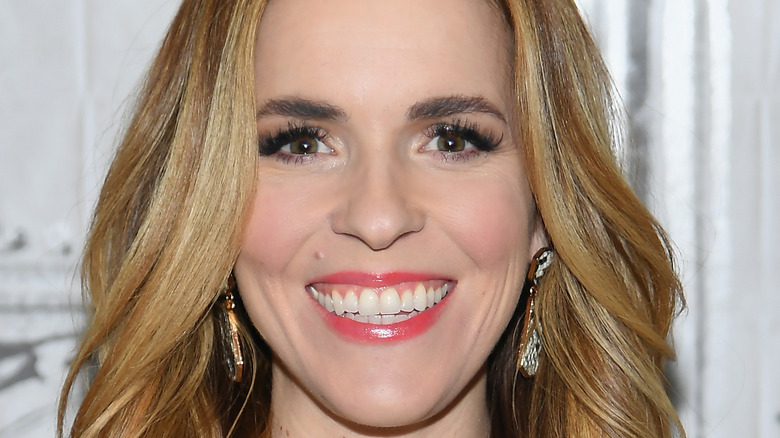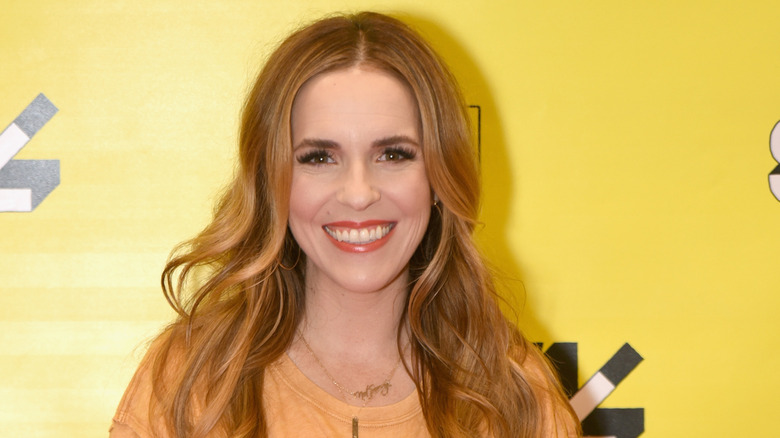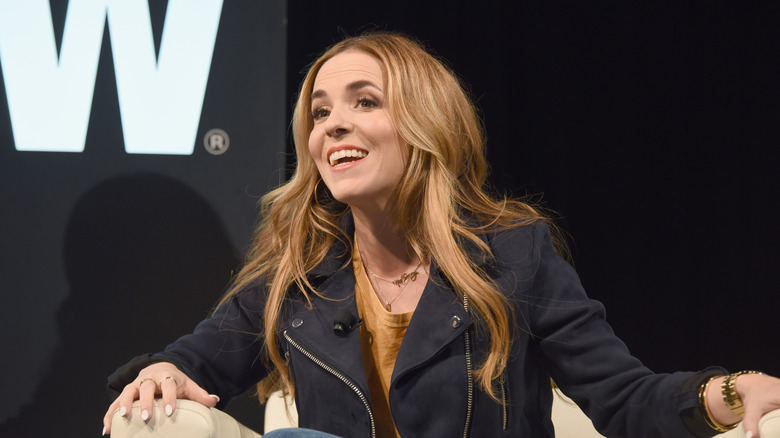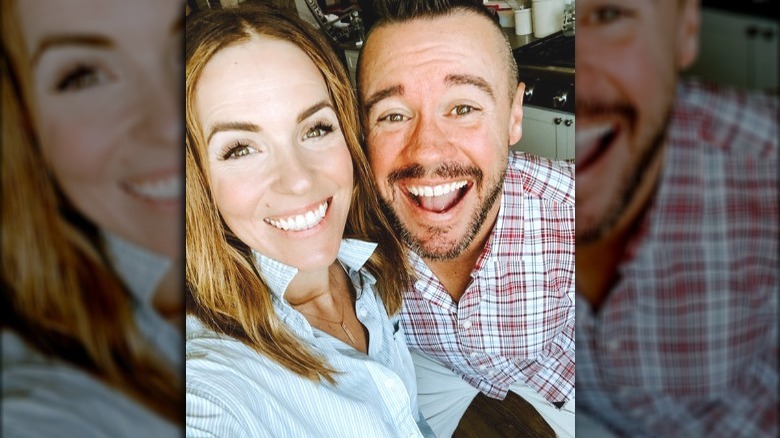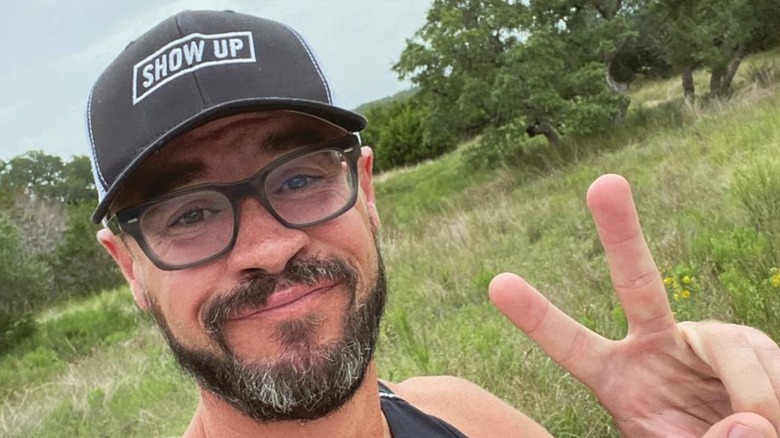Rachel Hollis' Scandals Explained
The downfall of motivational speaker Rachel Hollis was inevitable; her perfectly curated life which often came accompanied by a stream of cliched inspirational quotes created a persona that seemed almost unbelievable.
And while constructing a fake reality hardly seems remarkable on social media, Hollis' brand as a self-reliant #girlboss found itself in her numerous self-help books, a podcast, and conferences — all preaching the message: "You, and only you, are ultimately responsible for how happy you are" (via The Washington Post).
However, the toxic positivity in her rhetoric of "giving women the tools to change their lives" (via Instagram) was just a few controversies away from being refuted, as Hollis' ignorance of her privilege as a white, rich woman couldn't be ignored. The New York Times best-selling author of "Girl, Wash Your Face" posted a (now deleted) Instagram video that may have been the last straw for many of her fans.
Rachel compared herself to Harriet Tubman
In the video shared to Instagram, Rachel Hollis responded to a commenter who found her "unrelatable" after she mentioned having a housekeeper "come twice a week to clean my toilets" and the influencer did not take it well. "Someone commented and said 'You are privileged AF.' And I was like, 'You're right, I'm super freaking privileged. But also, I worked my ass off to have the money — to have someone come twice a week and clean my toilets,'" she said. Hollis approached the hole she wouldn't stop digging herself into, adding, "What is it about me that made you think I wanna be relatable?"
It could be the fact that her books try to relate to her audience with cutesy anecdotes and revelations about herself (via Time). "No sis, literally everything I do in my life is to live a life most people can't relate to. Most people won't work this hard. Most people won't get up at 4 a.m. Most people won't fail publicly again and again just to reach the top of the mountain," she continued, finally coming to the conclusion, "Literally every woman I admire in history was unrelatable. If my life is relatable to most people, I'm doing it wrong."
While the video was already tone-deaf, ignoring structural and racial privileges that helped her career, Hollis' caption was the icing on the cake with references to other "unrelatable" women like "Harriet Tubman, [Ruth Bader Ginsburg], Marie Curie, [and] Oprah Winfrey."
Rachel lost 100,000 followers after the video
Needless to say, the author of "Girl, Stop Apologizing" isn't great with apologies. Rachel Hollis blamed her team in her initial apology (which has, again, been deleted), arguing: "I listened to my team instead of my gut." Her second apology resembled the carefully PR vetted "notes apologies," and was slightly less narcissistic than social media users suggested. However, it did not stop the backlash.
Louiza Doran, an anti-racism educator called Hollis out for diminishing her housekeeper's work to "cleans the toilet" as "the most disgusting capitalistic, privileged flex that was so quick, but it said so much about how she as a human being views the power dynamic and the social hierarchy," on her Instagram Live.
It wasn't a widely contested view either, as Twitter agreed vehemently, leading to the unrelatable girl boss losing 100,000 followers in the aftermath (via The New York Times). But like Hollis likes to remind people, she has failed publicly many times, "again and again just to reach the top of the mountain."
Rachel profited off her marriage
Rachel Hollis is no stranger to being canceled or having to release apologies — no matter how unconvincing they are. However, the self-help author managed to stay on top of The New York Times bestseller list for 46 weeks, despite many of her ventures being blatantly problematic. She's been accused of plagiarizing inspirational quotes, including a line from Maya Angelou's poem "Still I Rise" (via BuzzFeed), for which she again blamed her team.
Hollis's "Rise Together" couples' conference was a culmination of the hundreds of happy Instagram posts she posted with her husband, Dave Hollis. The conference for women and couples marketed the couple as relationship pros, offering "some tangible advice for improving their relationship." Attendees paid $1,800 to hear from them and possibly save their marriages, only to find Rachel and Dave divorcing two years after.
Ironically, she denounced pseudo-happy couples in a 2019 leadership conference (via YouTube). Rachel entered the realm of self-help and entrepreneurial feminism when it was still cool, and filled a gap for women who couldn't identify with liberal feminism (via The Washington Post). However, the impending end of #girlboss and corporate feminism (via The Atlantic) demands she revamp her brand. If only Rachel took her own advice: Girl, wash your face.
Rachel's ex-husband sadly passed away
After heavily promoting themselves as the perfect couple to fans for years, in June 2020, Rachel and Dave Hollis announced that they were splitting up. The controversial self-help author posted on Instagram that, after 18 years and four children together, they had "made the incredibly difficult decision to end our marriage." Rachel also clarified: "We remain dear friends as we raise our family as co-parents and run our company as partners."
She proved just how true a statement that was when, in February 2023, Dave shockingly passed away at his home in Texas. Although the cause of death has yet to be confirmed at the time of writing, Dave was reportedly hospitalized shortly prior for heart problems, as a spokesperson informed The Los Angeles Times. Dave, who was a successful author just like his ex-wife, was just 47 years old, and naturally, Rachel was devastated by the loss.
"I have no words and my heart is too broken to find them," she admitted in an Instagram post following the sad news. The self-styled self-help guru also asked fans to keep the former couple's kids in their thoughts during an incredibly difficult time for the family. Dave previously acted as the president of worldwide theatrical distribution for Walt Disney Studios, where he worked for 17 years, including on lucrative franchises like "Star Wars."
